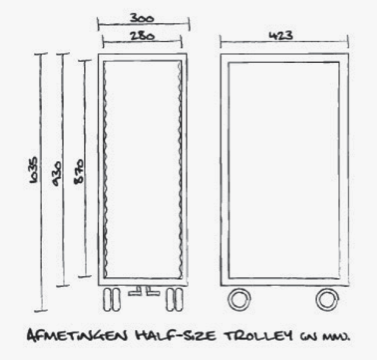GENERAL INFORMATION
- All information about the competition will be provided through the DIOPD website only (www.diopd.org/happytrolley). All communication will be in English.
- An example trolley is on display in the main hall of IDE Delft.
- The competition is open to any registered student in the IDE Delft faculty. Entries may be submitted by individuals or by teams (of maximum six students). Teams may include students of other TU Delft faculties, but should include at least one IDE Delft student.
- The jury will consist of delegates to be determined by the competition organisation. The Jury members will be announced through the website.
- The jury’s decision is final. In the first round, the jury will designate 20 winning entries, and will not specify a ranking (based on submitted entries, the jury may decide to select more or less than 20 entries). Additionally, the jury may award other entries with a ‘honourable mention’. In the second round, the jury will designate one winning entry, and may also award other entries with an ‘honourable mention’. No correspondence on jury decisions will be possible.
- The design entries will be judged on four main criteria: (1) originality of idea; (2) potential contribution of the design to wellbeing; (3) quality of presentation; (4) feasibility of the design & intended usage. For the flourishing criteria, competitors are referred to the DIOPD manifest (published on the DIOPD website), which represents core values for ‘design for human flourishing’
- An award will be provided by KLM (will be published on the competition website).
- The intellectual property rights of all entries remain the exclusive property of the author(s) thereof. Materials (e.g. presentations and prototypes) received by the organisers remain the property of the authors, but the organisers have the right to use the materials for publication purposes.
- DIOPD and KLM have the right to publish entries on the DIOPD website and on other websites and/or media.
- Any questions about the competition can be submitted to p.m.a.desmet@tudelft.nl
REGISTRATION OF PARTICIPATION
- Individuals or teams can register for participation before or on January 20 by sending an email to p.m.a.desmet@tudelft.nl
- Registration is required for participating in the competition.
- Registration requires the following information: names, contact info (email address and phone number), and student numbers of all team members. In case of teams, one member should be appointed as key contact person. A team name can be provided but this is not compulsory.
- In the registration phase no additional information (e.g. design ideas) should be submitted.
SUBMISSION STAGE 1
- First entries should be submitted before or February 25. Details for submission will be provided to registered students and student teams.
- Designs can be based on one up to five trolleys.
- Design proposals are drafted in English. Competitors or teams of competitors will submit one A1 panel that presents the design (mounted on flat, stiff, strong backings, portrait layout), and one A4 size envelope that contains an A4 copy of the submitted panel, with written on the back the name or names of the submitting students (and/or team name).
- The A1 panel should present the intended user group, location of use, design, and provide information on how/why the design contributes to the flourishing of the user. There are no additional regulations concerning the content of the panel; competitors can decide themselves on the most effective ways to present their proposals. The panel may not contain any information indicating the identity of the competitors to ensure anonymous judging.
- Juries will not examine any additional documents or models.
- DIOPD may decide to provide support (e.g. feedback sessions) for creating the initial entries. Registered competitors will be notified about this support.
- Before or on March 5, the Jury will notify participants which entries have been selected for the second stage of the competition.
SUBMISSION STAGE 2
- Competitors will develop a prototype of their design plan. Trolleys will be made available by DIOPD. Competitors will be asked a contribution of 25 euro per trolley (and costs for building prototypes will not be reimbursed).
- DIOPD intends to organise some support in producing the prototypes (e.g. access to TU Delft workshops). Registered competitors will be notified about this support.
- Design proposals have to be drafted in English. Competitors or teams of competitors will submit a prototype of the design and one A1 panel (mounted on flat, stiff, strong backings, portrait layout), that presents the intended user group, location of use, design, and provides information on how/why the design contributes to the flourishing of the user. Additional requirements will be communicated to registered competitors.
- Prototypes and posters should be handed in on May 6. Location for handing in will be communicated in a later stage.
- Prototypes and posters will be exhibited on May 24 on the DIOPD launch date. On that date, the jury will announce the winning design in an award ceremony.
DIOPD – Positive Design Manifest
Positive Design….
(1) creates possibilities
Positive Design envisions and realizes optimistic futures. Rather than merely reducing people’s problems, it offers them opportunities to improve their wellbeing.
(2) supports human flourishing
Positive Design uplifts people. It enables and inspires people to develop their talents, to increase their freedom, to deepen their relationships, and to contribute to their communities.
(3) enables meaningful activities.
Positive Design encourages people to balance pleasure and virtue. It stimulates people to engage in meaningful activities that are rooted in their deeply held values.
(4) embraces rich experiences.
Positive Design affects the complete pallet of human experiences. Beyond short-term pleasures, it focuses on lasting experiences that involve both positive and negative emotions.
(5) accepts responsibility
Positive Design is genuine in its purpose and intention. It takes responsibility for its short- and long-term impact on individuals as well as on communities and society.





